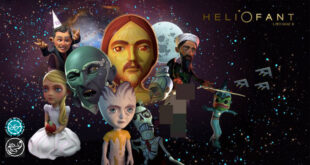But his appetite proved equal to the talks, and he was soon cash-starved, so he agreed to help the CIA assassinate his friend Awlaki, hoping to pocket the $5m reward.
Awlaki was killed in September 2011, but the CIA never coughed up, and Storm decided to go public with a series of articles in Jyllands-Posten (publisher of the notorious cartoons caricaturing the Prophet Muhammed in 2005), and publish his memoirs, which like Nasiri’s, show the ‘intelligence’ agencies in a shocking light.
But, unlike Nasiri, Storm is genuinely proud to be fighting Islam. “In a school project, my son Osama decided to make me his subject … and wrote an essay entitled: ‘My Dad, the Hero’.” Storm has twinges of regret for murdering his bosom buddy (if his claims are to be believed).
Nowhere in the memoir is Awlaki’s guilt for any terrorist operation actually shown without a doubt. He was rather always on the run, writing fiery tracts for Inspire, encrypting messages, and trying—mostly unsuccessfully—supplies of items that might or might not be for building bombs.
All this seems faintly irrelevant given IS’s success in the past six months. What formerly looked like a wildly optimistic long-term plan on the part of al-Qaeda remains eerily on-track despite the killing of thousands of “terrorists”, including Bin Laden and Awlaki.
What can we learn from these memoirs?
First, while Wahhabi-inspired Islam attracts some disillusioned westerners, their commitment is easily jettisoned. Its rote nature creates a rigid mindset conducive to both terrorism and corruption.
For the past three decades thousands of Saudi youth have chosen death fighting the corrupt, pro-US monarchy, be it by fighting in Syria-Iraq or underground in Saudi Arabia.
Uneducated westerners like Storm are easily seduced by a kind word from a Salafi imam, an offer of a free study course in Yemen, and the simplistic rote beliefs of Wahhabism, which dismiss the scholarly and peaceful activist tradition of the MB (let alone Shi‘ism).
Storm’s most shocking revelation is of a letter from Saudi officials to Al-Qaeda in the Arab Peninsula leader Nasir al-Wuhayshi in 2011 proposing a deal: “They would pardon Wuhayshi and donate weapons and money if they stopped fighting the Saudis and the Americans and focused instead on fighting Shia rebels in northern Yemen.”
Clearly, for western converts to Islam, however well-meaning, secular consumerism is a heavy burden hard to shake. Despite admiring Islam for its truths and its great history, Storm was unable to shed his cultural baggage.
For a century now, since western secularism has taken hold, many disillusioned western youth have embraced eastern beliefs, including Buddhism, Hinduism and Islam. But the first two stop short of trying to transform society through a political movement of reform.
Islam does not shy away from politics; that is why spies like Nasiri keep the faith, while flotsam like Storm stumble into Wahhabism, which mimics the nihilism of western anarchism.
Some western strategists reach out to nonviolent Islamists such as the Muslim Brotherhood. In 2010, President Obama issued Presidential Study Directive 11 (PSD-11) advising a shift from support for dictators to working with “moderate” Islamic political movements (though his actions since then show how wobbly this commitment to peaceful evolution is). They are searching for ways other than war to deal with the now uncontrollable extremists, to stabilize Muslim society where the post-colonial neoliberal model has failed.
Other strategists, like Storm’s handlers, continue to live in a fantasy world of 007 and double agents, sure that if they can only kill that nasty Bin Laden, Awlaki, whomever, we will all live happily ever after.

Western spies, intelligence agencies and Salafi-Wahhabis
Pages: 1 2
 Mouood Mouood English Edition
Mouood Mouood English Edition



